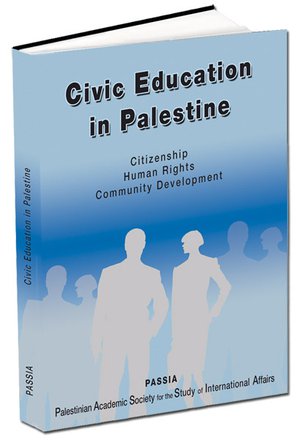Civic Education in Palestine Citizenship, Human Rights, and Community Development
In a set of three seminars, the PASSIA civic education project sought to develop and em¬power groups of young Palestinian professionals to deal more effectively with the tasks ahead by enhancing their civic knowledge, skills and norms. Local and foreign experts in the field imparted basics such as the meaning of constitutional democracy, types of government, features of the political system, and the ability to identify public issues and influence public policy decisions. In addition, each seminar focused on a specific issue: one on Citizenship, one on Human Rights, and one on Community Development. This publication contains a selection of the lectures and presentations given during those three seminars, as well as an outline of the lecture programs and a selected bibliography.
Overview
In 2005, PASSIA embarked on this new project feeling that it is imperative at the current critical stage in Palestinian history that people who are and will be shaping their future are equipped with relevant knowledge and experience. The leaders of tomorrow lay today the basis of civic life in the anticipated state and promote the practice of a rule-of-law regime; yet, it is evident that there is a huge lack of the basics of civics among Palestinians, including appropriate understandings of constitutional principles (rule of law, separation of powers, individual freedoms and rights), concepts and purposes of citizenship and governments, and political and legal processes created to make decisions, seek consensus, and resolve conflicts in a free society, and so on.
For a democracy to survive and flourish, its citizens must know about the basic features of a democratic political system to be able to access it when their interests are at stake, and they must believe in the importance of certain key democratic values, such as tolerance for divergent viewpoints and support for the rule of law. They must also be willing and able to participate in local and national politics, and they must believe that their participation is important to the continued viability of the democratic political system.
In countries emerging from authoritarian rule, citizens often lack democratic experience, especially with regard to knowledge about formal democratic structures and processes and thus about the opportunities that exist for advancing their interests. Another common aspect in transitioning countries is that citizens experience difficulty adjusting to the competition, compromise, and loss that are inherent parts of the democratic political process. Without values such as political tolerance, trust in democratic institutions, and respect for the rule of law prevailing, this can be severely destabilizing, particularly if it ignites or exacerbates economic, ethnic, religious, and other forms of tensions.
One of the tools to counter the lack of democratic socialization is civic education, which, by imparting the necessary skills and knowledge, helps promoting support for democratic behaviors and values among ordinary citizens.
With this in mind, PASSIA launched the project, providing training courses in civics and governance for young professionals, with the aim to achieve a level of understanding and acceptance of the rights and responsibilities among the citizens that is required for the maintenance and improvement of any constitutional democracy.
In a set of three seminars, the PASSIA civic education project sought to develop and empower groups of young professionals to deal more effectively with the tasks ahead by enhancing their civic knowledge , skills and norms. In addition to imparting basics such as the meaning of constitutional democracy, types of government, features of the political system, and the ability to identify public issues and influence public policy decisions, the seminars focused on the issues of Citizenship, Human Rights, and Community Development.
This publications contains a selection of the lectures and presentation given during those three seminars.
Jerusalem , April 2006
Dr. Mahdi Abdul Hadi
Head of PASSIA
Jerusalem
Introduction
Dr. Mahdi Abdul Hadi
Introduction: Some Basic Ideas Related to Democratic Government
Dr. Gregory Mahler
Constitutional Democracy: Universal Principles
Dr. Gregory Mahler
Constitutional Democracy: Problems
Dr. Gregory Mahler
Democratic Institutions, Structures and Processes
Dr. Gregory Mahler
Constitutional Political Culture in the Middle East
Dr. Gregory Mahler
Constitutional Democracy - Principles and Problems
Dr. Ali Jarbawi
Constitutional Democracy as a Universal Concept and As a Political System of Governance
Dr. Ali Jarbawi
Citizens - Subjects or Metics / What is Citizenship?
Dr. Said Zaidani
Religion and State from an Islamic Perspective
Dr. Mustafa Abu Sway
Civics, Government, and Citizenship - Case Studies: Citizens as an Influential Tool of Change
Terry Bullata
The Constitutional System of the Palestinian National Authority
Feras Milhem
Community Development Projects
Luna Shamieh
Community Development - A Case Study Presentation
Isam Akel
Annexes
Annexes I: Selected Bibliography
Annex II: Lecture Programs

